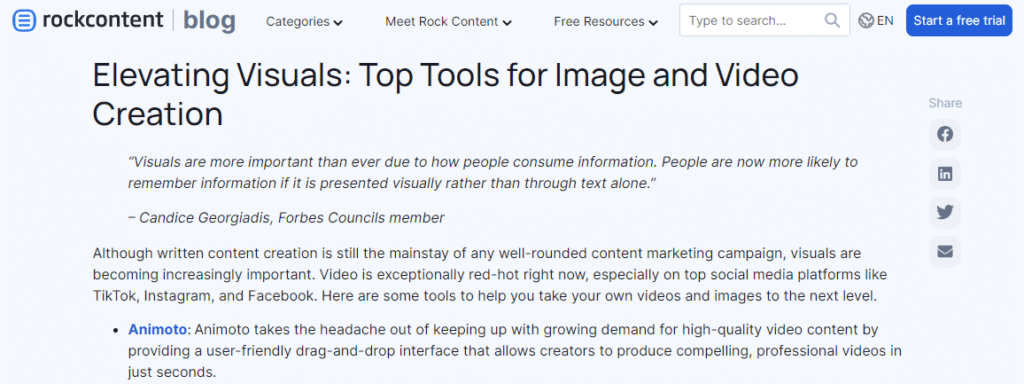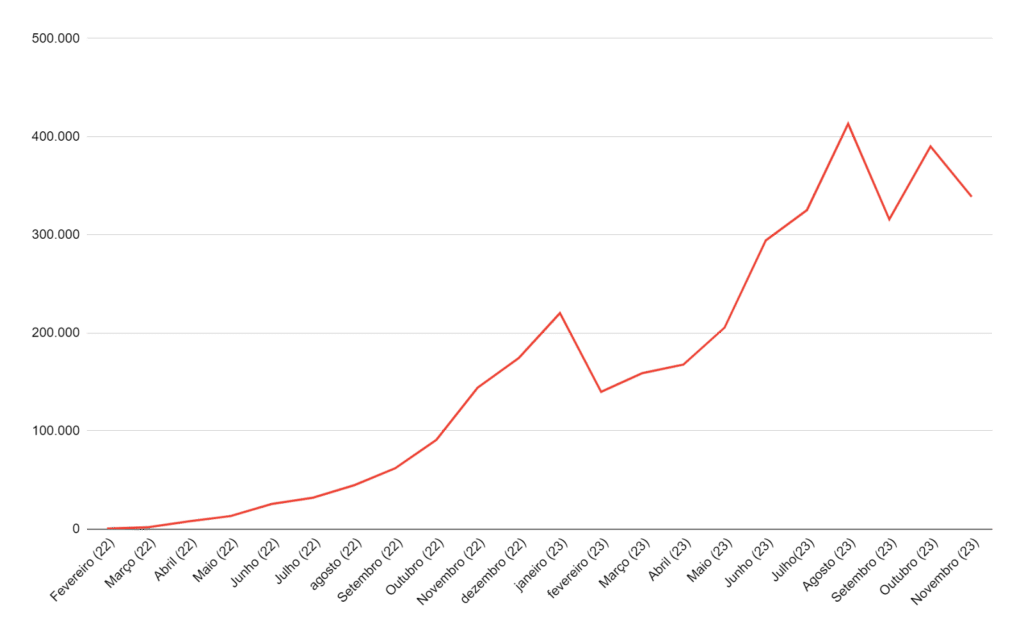In the last four years, several events have transformed the way we generate, consume, and interact with content—from a global pandemic to the popularization of Artificial Intelligence.
These changes have also been reflected in digital marketing and SEO strategies.
Google’s recent updates seek to ensure that the algorithm aligns with the new user needs and delivers the best response to search intent.
Starting in May 2022 through Google Core Update in March, we have seen blogs and sites with strong and established SEO strategies lose their results significantly.
In fact, several Rock Content clients who followed the best market practices faced this challenge.
It didn’t take long for us to realize that the traditional techniques for recovering organic traffic, such as extending and updating content, for example, were no longer as effective as before. The issue was much deeper!
To solve the problem, we needed to come up with new hypotheses and SEO strategies that addressed these changes.
In a year of testing, we achieved results such as a 67% increase in SERP position and a 398% improvement in CTR.
Producing content that ranks in 2024 has been a challenge for many professionals, so we will discuss more details about the strategies used with our clients and the results we have already achieved. Keep reading!
Download this post by entering your email below
Adapting the Strategy–Step One: Raising Hypotheses
Amidst so many challenges, certain points caught our attention with each Google announcement. The words expertise, experience, authoritativeness, trustworthiness and perspective were always emphasized.
It has always been evident to everyone that the algorithm would prioritize content focused on user experience, emphasizing originality and production with the user in mind, not search engines.
Considering this, along with the increasing trend of online searches conducted using AI tools, such as ChatGPT, Gemini, and Microsoft’s Bing Chat, we began to formulate hypotheses: Why would someone search outside of an AI tool? And how does this relate to what Google is prioritizing in its search results today?
We arrived at some conclusions:
1. Artificial Intelligence doesn’t make decisions for you;
2. Artificial Intelligence cannot answer complex questions that require in-depth analysis;
3. Despite people’s interest and use of technology to their advantage, there is a need for the humanization of processes, and individuals feel more comfortable and confident with information provided by an expert (as noted for some time by Robert Cialdini, author of the book “Influence: The Psychology of Persuasion”);
4. Most information produced by AI tools is not updated in real-time; thus, they cannot assist in moments of buzz and sudden increases in searches related to specific events.
Furthermore, when observing consumer behavior trends in general, people have a strong desire for objective answers, a demand for dynamic and interactive content, a quest for novelty, a fear of fake news, and a search for neutrality.
Have you noticed how these behaviors and trends fit perfectly with what the algorithm suggests subjectively? People and the algorithm want:
- More specific answers, focusing on the user’s search intent;
- Content with multimedia materials;
- New, updated, and impartial information; and
- Authentic content.
So, based on this information, we faced a significant challenge: What should be done when planning and producing content, considering all these trends, so that the algorithm begins to recognize the focus on user experience and the high quality of information?
Step Two: Creating an Action Plan and Starting Tests
Analyzing results from clients who maintained steady growth and Rock Content’s own blog, we attempted to identify patterns of characteristics in the content to understand why good performance was sustained.
The main points we found were quite simple and evident:
- The content is of very high quality and more substantiated than that of the competition, with qualified professionals in each respective area contributing to production, bringing human perspectives that help make the content unique.
- There is a constant effort to work on themes and approaches that have not yet been explored, focusing on analysis and insights into the subject matter. In other words, less content like “what it is and how it works” and more analysis, experiences, and trends.
In summary, the primary content that yields results is those that were not so easy to replicate and clearly brought human expertise, depth, and critical thinking behind them. One of the most compelling cases that made this very clear was the partners’ blog of iFood, our client and the largest delivery app in Latin America.
While recognizing that this provided more clarity regarding the direction we should take, it also presented a significant challenge: How can we achieve this level of quality in recurring and scalable content production?
Interviewing and hiring one or more technical/specialist writers make content production more expensive. Thus, we needed to find a scalable and accessible approach without sacrificing the elements of expertise, experience, and human perspective explicitly in the content.
Step Three: Creating an MVP
After several conversations and deliberations–both internally and with some of our key clients, we had the following insight:
What if it were possible to combine the content production expertise of our freelance talent pool in our marketplace with the know-how and experience of professionals operating in fields related to our client’s core businesses?
The concept was to engage professionals versed in diverse areas who could contribute in various capacities. The name + qualification + professional registration + profile (such as LinkedIn or Lattes) would be cited throughout the content as a means of conveying expertise and authority – a criterion explicitly highlighted in the documentation provided by Google.
Thus, the concept of expert-driven content emerged.

These professionals commenced contributing to various pieces of content related to their expertise and experience, whether professional or as consumers, through concise written interviews. These interviews were always geared towards offering their perspectives on the central theme of the content, thereby supplementing all other references available to the writer.
The quotations from these professionals were seamlessly integrated into the texts, supplemented by market data and information from entities regarded as authoritative in the respective niche. These citations became mandatory and were incorporated through direct citations.
It is crucial to underscore that these professionals do not necessarily require digital prominence, as the objective is precisely to incorporate perspectives from everyday individuals, thereby humanizing the brand’s content.

First Results Achieved With Expert-Driven Content
After conducting the first tests, we can affirm that expert-driven content played a fundamental role in generating organic traffic and has established itself as a valuable SEO strategy for the future.

Here, we have three examples of clients who either adopted or did not adopt the expert-driven content strategy (their names will not be mentioned due to privacy reasons).
Throughout 2022, the blog represented by the blue line experienced a very aggressive decline in results. Starting in January 2023, we began exploring possibilities for gaining authority and transmitting expertise by adding more external references to most of the newly produced content.
In August 2023, we conducted a test involving the insertion of new quotes into a specific group of content (a pilot project for expert-driven content). Three months later, we analyzed the results and observed the performance improvement indicated in the table below.
Meanwhile, the blog represented by the yellow line adopted the strategy of including new quotes and external references from the outset of its productions, which led to results being boosted from the beginning, even amidst a scenario of significant decline in results and market expansion difficulties as a whole.
Finally, the blog indicated by the red line did not alter its strategy and continued with a very similar approach to the one previously adopted by the blue line blog.
This SEO strategy and content guided by specialists were structured and validated by our teams in recent months and have been proven with each new Google update.
In addition to the growth in organic traffic, by updating existing content with specialized information elements, we achieved significant improvements in rankings and CTR.

Furthermore, incorporating content guided by specialists from the beginning of a content strategy can accelerate the long-term growth of organic traffic sessions.

The Materialization of Our Predictions and Next Steps
We strive to live up to the title of being a reference in Content Marketing, so we continue to test numerous strategies, tactics, and hypotheses and document what has yielded results for SEO today and tomorrow.
We are also developing a new On-Page SEO checklist to ensure optimal performance. The key resources to prioritize during content production include:
- Inclusion of sections with quotes from experts, providing proper attribution, and incorporating hyperlinks to their professional networks;
- Identification of authors and their qualifications/experience;
- Incorporation of multimedia elements (videos, infographics, embedded materials, etc.) to provide supplementary information and reinforce the search intent within the content;
- Frequent utilization of data and information from research and institutions/organizations pertinent to the topic; and
- Integration of interactive content within your primary content, such as mini quizzes and calculators, to deliver a personalized experience and aid your audience in making individual decisions.
Furthermore, as we mentioned, the list of hypotheses to be validated continues to expand. There are still numerous questions we are eager to answer:
- Does the professional’s online relevance influence performance?
- Do the perspectives of the average user and an expert yield different results?
- Is it necessary to employ this technique in all content?
- Would repurposing materials from lectures, webinars, and similar events have the same impact as a 100% original quote?
These are just a few of the many questions we are exploring to anticipate trends and develop a scalable production method with guaranteed performance returns. SEO remains a long-term strategy, and the need for constant testing is increasingly critical.
Contrary to what many believe, the proliferation of AI tools appears to be humanizing the internet. Those who create content in a personalized manner and seek competitive differentiation are poised to thrive.

![[Rock NA] State of Marketing Reports 2024 – Comkt Hubspot State of Marketing Report 2024](https://rockcontent.com/wp-content/uploads/2022/07/Banner-Fino-Rock-Convert-2500-%C3%97-500-px-19.png)






